Ultra-early ripening potato variety “Karatop”
Potatoes are one of the main food products in Russia. It is grown in almost all regions and climatic zones of the country. When planting, gardeners focus primarily on high-yielding, easy-to-maintain varieties that have excellent taste and good shelf life. These crops include the Karatop potato, a high-yielding variety that is easy to care for and resistant to adverse weather conditions.
Description of the variety
The Karatop potato was bred by German breeders in 1996, and two years later it was included in the State Register of Breeding Achievements of the Russian Federation. It has many individual characteristics that distinguish it from other varieties.
What is the difference from other varieties
Among the main cultural differences:
- Rapid achievement of maturity. Potatoes are possible to eat 40-45 days after landings, while full ripening occurs 60 days after planting.
- Possibility of growing in any soil. Potatoes grow confidently in almost any soil, but prefer light sandy soils.
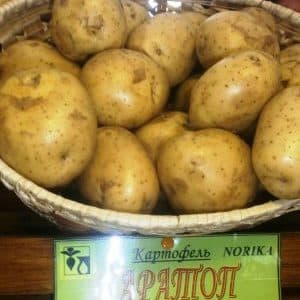
- Resistance to mechanical damage. Tubers easily tolerate cuts and rough transportation.
- Long-term storage. Potatoes of the Karatop variety are stored until spring without loss of taste.
- Excellent external characteristics. The tubers have a spherical shape, a smooth surface and a strong yellow skin.
- Ease of processing.Potatoes are easy to peel and heat treat.
Of course, the distinctive features of Karatop largely depend on correct and careful adherence to recommendations for cultivation and care.
Chemical composition, trace elements and vitamins
Karatop potatoes contain approximately 11-15% starch, which has a good effect on its ability to ripen quickly. However, this property makes it completely unsuitable for use in some branches of the food industry - in particular, the variety is not suitable for the production of chips and potato powder.
Reference! The content of certain microelements in potatoes directly depends on the composition of the soil and the fertilizers used at all stages of growth.
Karatop is rich in the following vitamins and minerals:
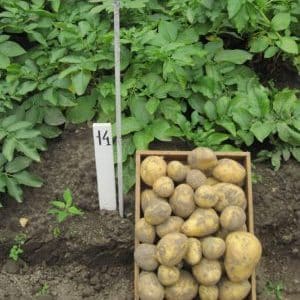
- vitamin B6;
- vitamin C;
- potassium;
- silicon;
- cobalt;
- copper;
- molybdenum;
- chromium.
Characteristics of tubers and yield
Karatop tubers have a spherical shape (slightly elongated samples may be found), smooth skin of a delicate yellow color and light yellow flesh. The surface of the potatoes is uniform, without shoots or tubercles.
Attention! It is the shape of the tubers that gives the Karatop variety its culinary advantages: smooth and even potatoes are easier to peel.
The variety has impressive productivity:
- 5–27 tons per 1 hectare in the Middle Volga region;
- 20–43.5 tons per 1 hectare in the North-West region.
Reference! With a properly selected planting region and proper care, the yield of Karatop from one hectare of land can reach a maximum of 494 c/ha.
Of course, maximum yields can be obtained in other areas. It all depends on the desire and skills of the gardener who has undertaken to grow Karatop.
Region for cultivation and planting dates
The Karatop potato variety is suitable for cultivation throughout Russia.
However, according to the State Assortment Register, Karatop grows best in the following agricultural regions:
- Northwestern;
- Volgovyatsky;
- Middle Volga;
- West Siberian.
The Karatop variety is planted when the soil reaches a temperature of at least +7-8°C. Depending on the planting area, the planting time according to the desired soil temperature occurs:
- Far Eastern region - after the 15th of May.
- Northern, East Siberian, West Siberian - after May 25 or before June 5.
- Northwestern - from May 15 to 25.
- North Caucasus region – the first days (until 10) of April.
- Central Chernozem, Volga-Vyatka, Middle Volga - until May 10-12.
- Central region and Kaliningrad region - the first ten days of May.
Of course, these are not entirely accurate dates, since favorable temperatures can set either earlier or later than the specified date. When choosing a landing time, it is best to focus on weather conditions.
The main advantages and disadvantages of the variety
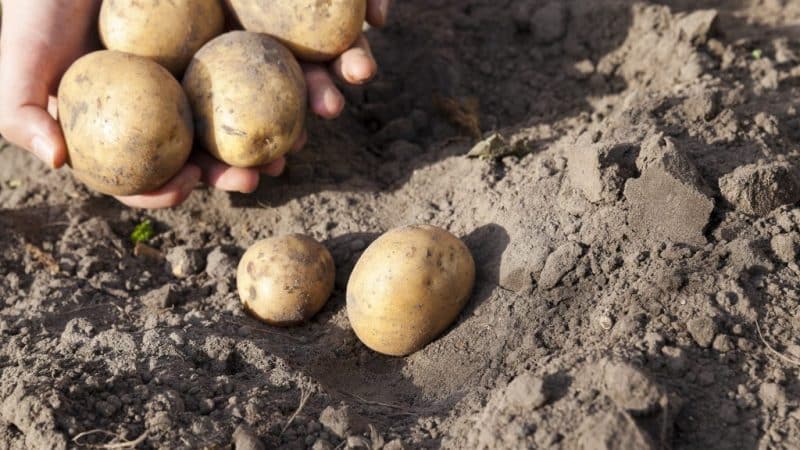
The main advantages of Karatop potatoes include the following features:
- there is no need for constant careful care;
- the ability to grow on any type of soil;
- crop resistance to diseases;
- speed of tuber ripening;
- possibility of long-term storage;
- resistance to mechanical damage;
- excellent external and taste characteristics.
Disadvantages of the Karatop variety:
- drought intolerance;
- poor watering reduces the growth of tubers, which significantly impairs the harvest.
Remember that with poor care, even the obvious advantages of the variety will not help in obtaining a good harvest.
Features of planting and growing
Like any potato, Karatop requires proper planting and proper care during cultivation.
Preparing for landing
Planting material must be selected in advance, even during the autumn bulking. For planting, identical tubers of a size slightly larger than a chicken egg are selected. At least a month before planting, potatoes are germinated in a warm room with plenty of light. Before planting, the tubers are sorted again, removing those that have not sprouted.
Attention! Under no circumstances should damaged tubers be used for planting. Such planting material will not only worsen the quality of the crop, but may even rot in the ground before germination.
In addition to these manipulations, it is advisable to pre-treat the potatoes with a solution of potassium permanganate or copper sulfate to prevent fungal diseases.
Planting scheme and technology
Karatop potatoes are planted according to the following scheme:
- The distance between rows of potatoes should be at least 50 and no more than 80 cm. This arrangement will ensure optimal hilling of future potato bushes.
- The distance between potato bushes in a ridge should be at least 30 and no more than 50 cm.
- The depth of the holes for planting should be 15-20 cm. Before throwing in the tubers, the hole is filled with wood ash and humus to one third.
Attention! When choosing the optimal potato planting scheme, take into account not only the recommendations of experts, but also the capabilities of the area allocated for planting. Avoid placing beds too close together to increase yield. Such manipulations will make it difficult to access the bushes during cultivation of the beds and reduce the quality of the harvest.
After planting the potato beds, they need to be carefully loosened with a rake and thoroughly watered.If all manipulations were performed correctly, the first shoots of the crop will appear after 10 days.
Features of cultivation
The agricultural technology of the Karatop variety is practically no different from the standard one and requires the same actions as growing any other potato.
Standard actions aimed at growing a high-quality potato crop include:
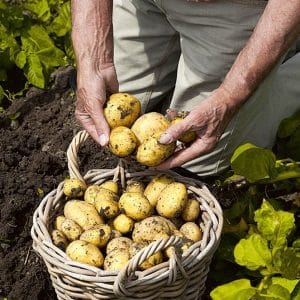
- Regular loosening of the soil between the beds, which begins 5-7 days after planting.
- Thorough weeding of the beds.
- The use of peat mulch to protect plantings from drought, possible frosts and sunburn. Additionally, mulching will protect the beds from weeds.
- Hilling up plantings - the procedure is performed when the bushes grow to 2-25 cm.
Weeding potatoes is the most important condition for the healthy growth of tubers, but in conditions of extreme heat or drought it is better to avoid it: the weeds will protect the potato bushes from sunburn, and the soil around them from drying out and cracking. Of course, you shouldn’t let weeds take over your entire garden.
For convenient and high-quality processing of beds, use high-quality gardening tools: a pointed hoe, a light and durable rake. In addition to these tools, it is advisable to purchase convenient soil cultivators from a specialized store.
Nuances of care
Important points in caring for the Karatop variety include mandatory watering and proper feeding.
Watering mode
Before the flowering period of potato bushes, the beds are watered at least once a week, and in hot weather - up to 3-4 times, depending on the absorbency of the soil. As soon as the potatoes bloom, watering is increased to 2 mandatory times a week or more in case of severe drought.
The Karatop potato does not tolerate drought and heat well, so its yield depends on careful watering.
Top dressing
The fertilizing procedure is carried out simultaneously with watering - with water, useful elements will penetrate to the roots faster. To feed the Karatop variety, it is recommended to use potassium and phosphorus fertilizers.
Attention! If you fertilize the soil in advance in winter or the soil is sufficiently nutritious, you can do without fertilizing.
The soil is fertilized three times during the entire growing period. The first fertilizing is carried out with phosphorus fertilizer 10 days after planting the potatoes. The second with the same composition before flowering during the formation of buds. The third time they are fed with potassium 3 weeks before harvest.
Disease and pest control
In general, Karatop potatoes are resistant to nightshade diseases, but they also have vulnerabilities. It is defenseless against late blight and the Colorado potato beetle.
For fighting use:
- Against the Colorado potato beetle - insecticides (preparations “Karate”, “Fastak”, etc.). When using drugs, carefully ensure that the decomposition period of the drug is less than the growing season of potatoes.
- Against late blight - timely cleaning. If the period of intensive tuber growth overlaps with the time of fungal development, use fungicides (Ridomil, Revus, etc.). In addition, it will not be superfluous to monthly treat the plant stems and soil around the bush with a solution of copper sulfate or potassium permanganate (potassium permanganate).
Reference! For spraying, prepare a solution in the following proportion: 1 tsp. copper sulfate or potassium permanganate powder per 1 liter. water.
For best results, it is recommended to combine the above control methods. Thus, the potatoes will be protected from pests, and from diseases.
Harvest and storage
The time for full ripening of Karatop potatoes is about 50-60 days, depending on care, soil characteristics and weather conditions accompanying growth. Farmers should look for visual signs of readiness for harvest.
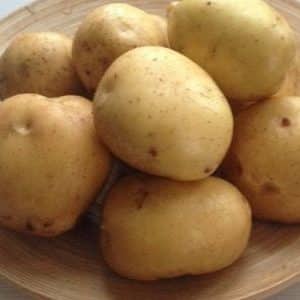 They begin digging potatoes after ⅔ of all the tops have dried and the bushes have fallen to the ground. But even in this case a problem may arise. Since the Karatop variety is early ripening, external signs of ripening may not appear immediately. Therefore, for the greatest reliability, after 50 days from the moment of planting, you need to dig 2-3 bushes in different places.
They begin digging potatoes after ⅔ of all the tops have dried and the bushes have fallen to the ground. But even in this case a problem may arise. Since the Karatop variety is early ripening, external signs of ripening may not appear immediately. Therefore, for the greatest reliability, after 50 days from the moment of planting, you need to dig 2-3 bushes in different places.
If the tubers are dry and covered with a thick skin, the harvest can be harvested in the near future.
The harvest is dug up with an ordinary shovel or using a walk-behind tractor - the Karatop variety allows you to safely use a mechanized harvesting method. After harvesting, the tubers are dried outside in partial shade for a couple of days until the adhered soil falls off.
Then they proceed to sorting and remove all damaged, rotten, wilted and green potatoes. Large root crops are stored for consumption, while smaller ones are left for planting next season.
Karatop potatoes have a high shelf life, so they can be safely stored until spring. The harvest is placed in a special vegetable storehouse, basement or cellar.
Important! If the tubers will be stored on a balcony or loggia, they should be reliably protected from sunlight to avoid the production of poisonous solanine.
The optimal storage temperature for the Karatop variety is +2-4°C, it should be established within 1.5-2 weeks from the moment the crop is placed in storage.If the room becomes too warm, the quality and shelf life of the potatoes will decrease significantly.
If there is a threat of freezing, the tubers are covered with straw or bags. The recommended air humidity in the room should be 85-90%; if it is lower, the crop will dry out; if it is higher, the root crops will rot.
What difficulties may there be when growing
Potatoes of the Karatop variety are unpretentious in care. Stable watering is important, on which productivity depends. If there is no direct access to water on the site or it is difficult, it is better to stock up on large containers to collect rain in advance or fill them in a timely manner, and then water the beds using a watering can.
If there is access to water, the work will be facilitated by an automatic sprayer located on the beds. This simple device will provide potatoes with constant access to the necessary moisture.
Advice from experienced gardeners and reviews about the Karatop variety
Most gardeners are satisfied with the Karatop variety. In this section, farmers share their experience and recommendations for growing.
Pavel Terentyev, Samara: “I have been growing potatoes for many years. Several seasons ago I tried to plant the Karatop variety for the first time. When purchasing, I was told that this is an early ripening variety, ripening in 60 days with sufficient watering. To be honest, I didn’t even believe it right away, but two months after planting, my family and I (to my surprise) reaped a very good harvest. The potatoes turned out to be of good quality and very tasty. The harvest lasted almost until summer. Since then I have recommended these potatoes to everyone I know.
I recommend storing potatoes directly in the garden if weather conditions allow it. This method will be useful for gardeners who do not have a cellar or have little space in the house.To do this, dig a hole of medium depth, cover the bottom with dense material, and sprinkle the potatoes on top with earth, straw or spruce branches. Karatope is well stored, which allows it to be placed in the ground.”
Nikolay Donchenko, Belgorod: “To avoid using chemicals, you can use citrus peels to protect against the ubiquitous Colorado potato beetle. The pest cannot stand their smell, but it will come in handy for the gardener. To make the product, you need to boil dry or fresh peels of orange, tangerine or lemon, and then spray the bushes and the ground around with the cooled broth. It is better to carry out the procedure several times over the summer, especially if there are a lot of beetles in the area. The method is proven and effective."
Anastasia Zharkova, Rostov-on-Don: “I found out about Karatop by chance when I was choosing potatoes to plant. I wanted to plant something new and unusual. At the market they advised me to take this variety; they said that with regular watering it can grow in any soil (and I just have sand in my garden). They also praised it for its early ripening, saying it ripens in 2 months. I didn’t expect, of course, that I would get a harvest so quickly, but after 65 days I harvested a basement full of potatoes. Karatop's tubers are strong, round, and store well. All relatives appreciated the taste. It was only difficult to water frequently, but the result was worth it. I strongly recommend that all gardeners try this variety.”
Ivan, Krasnodar: “Try planting potatoes so that the beds grow from north to south. So the sun will illuminate the plantings in the morning from the east, and in the afternoon - from the west. Potatoes will be able to receive maximum light and heat, which will have a positive effect on yield.”
Conclusion
The Karatop potato variety is early ripening, high-yielding and low-maintenance.The tubers are stored for a long time and are resistant to mechanical damage. The only requirement for growing is regular watering. If you follow a few simple recommendations, the planted potatoes will please you with the quantity and quality of the harvest.